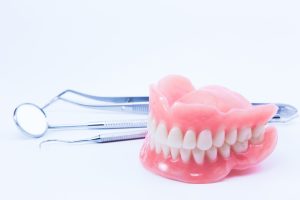 You may not think about your teeth in the same terms that you think about other aspects of your overall health. However, teeth are a vital part of your wellbeing. You need to keep your teeth healthy for the duration of your life — you only get one set! One of the best ways to maintain the integrity of your teeth is through preventive dental care. When you choose preventive dentistry, you address potential problems before they arise. By taking a proactive approach to oral health and avoiding extensive treatments, you can save yourself time and money as well. (more…)
You may not think about your teeth in the same terms that you think about other aspects of your overall health. However, teeth are a vital part of your wellbeing. You need to keep your teeth healthy for the duration of your life — you only get one set! One of the best ways to maintain the integrity of your teeth is through preventive dental care. When you choose preventive dentistry, you address potential problems before they arise. By taking a proactive approach to oral health and avoiding extensive treatments, you can save yourself time and money as well. (more…)
Find Children’s Dental Care that You Trust
 Your children’s oral health is a vital part of their overall wellbeing. While you may be thorough about following up with doctor’s appointments and the general physical health of your child, it can be easier to forget or back burner something like a dentist’s appointment. However, you can’t neglect the dental health of your children. Finding the right children’s dentistry situation is a matter of more than just scheduling and keeping appointments too. When you find dental care that you can trust, you’ll choose an environment in which your child feels comfortable and encouraged. (more…)
Your children’s oral health is a vital part of their overall wellbeing. While you may be thorough about following up with doctor’s appointments and the general physical health of your child, it can be easier to forget or back burner something like a dentist’s appointment. However, you can’t neglect the dental health of your children. Finding the right children’s dentistry situation is a matter of more than just scheduling and keeping appointments too. When you find dental care that you can trust, you’ll choose an environment in which your child feels comfortable and encouraged. (more…)
Contouring Is a Gentle Cosmetic Solution
 Sometimes a very simple cosmetic dentistry treatment can go a long way. When you want a beautiful smile that boosts your confidence, cosmetic dentistry is the solution for you. A procedure like contouring provides gentle shaping to your gums and dental enamel to create a more symmetrical, aesthetically appealing smile. If you’ve got an abnormally large tooth or a tooth that is strangely shaped, contouring can correct for many of these imperfections. The same goes for an excess of gum tissue. Contouring is minimally invasive and can be performed in just one session. (more…)
Sometimes a very simple cosmetic dentistry treatment can go a long way. When you want a beautiful smile that boosts your confidence, cosmetic dentistry is the solution for you. A procedure like contouring provides gentle shaping to your gums and dental enamel to create a more symmetrical, aesthetically appealing smile. If you’ve got an abnormally large tooth or a tooth that is strangely shaped, contouring can correct for many of these imperfections. The same goes for an excess of gum tissue. Contouring is minimally invasive and can be performed in just one session. (more…)
Get your Teeth Structure and Appearance Back with Dentures
 It’s easy to start to live with the little things as they come up. When you face a small change or challenge, you adjust and move on. However, some changes merit a response. You may think that you’re able to live with a condition like tooth loss, but you may not realize what you’re actually giving up. You don’t have to suffer through the pain and dietary adjustments (or potential long-term consequences) necessitated by extensive tooth loss. You can regain your teeth structure and the appearance of your smile with partial or full dentures. (more…)
It’s easy to start to live with the little things as they come up. When you face a small change or challenge, you adjust and move on. However, some changes merit a response. You may think that you’re able to live with a condition like tooth loss, but you may not realize what you’re actually giving up. You don’t have to suffer through the pain and dietary adjustments (or potential long-term consequences) necessitated by extensive tooth loss. You can regain your teeth structure and the appearance of your smile with partial or full dentures. (more…)
It’s Easy to Feel Unsatisfied with Teeth Whitening
 Who doesn’t want a brighter smile? Everyone wants to feel confident in their teeth when they show them off to the world, and often times, a little whitening would go a long way. Teeth staining is totally natural. It happens over time because of the foods, drinks, and lifestyle habits we adopt. Teeth whitening is a simple solution to help you get rid of these stains, and over-the-counter products have made it easy to find teeth whitening for yourself. However, these products also make it easy to feel unsatisfied with your whitening experience. Working with your dentist, you can find teeth whitening that gives you better results. (more…)
Who doesn’t want a brighter smile? Everyone wants to feel confident in their teeth when they show them off to the world, and often times, a little whitening would go a long way. Teeth staining is totally natural. It happens over time because of the foods, drinks, and lifestyle habits we adopt. Teeth whitening is a simple solution to help you get rid of these stains, and over-the-counter products have made it easy to find teeth whitening for yourself. However, these products also make it easy to feel unsatisfied with your whitening experience. Working with your dentist, you can find teeth whitening that gives you better results. (more…)
Dental Implants Tackle Simple and Complex Tooth Loss
 There’s no version of adult tooth loss that comes without struggle and anguish. It can be a truly traumatic experience. What you need most when you’ve suffered from tooth loss is a plan of action. Modern dental prosthetics allow you to regain the function and appearance of your original tooth or teeth. This helps you get back to normal after an upsetting event. Whether you’ve suffered from simple tooth loss (losing a single tooth) or complex tooth loss (extensive tooth loss in one or more areas of your mouth), dental implants provide stabilizing, long-term solutions for you. (more…)
There’s no version of adult tooth loss that comes without struggle and anguish. It can be a truly traumatic experience. What you need most when you’ve suffered from tooth loss is a plan of action. Modern dental prosthetics allow you to regain the function and appearance of your original tooth or teeth. This helps you get back to normal after an upsetting event. Whether you’ve suffered from simple tooth loss (losing a single tooth) or complex tooth loss (extensive tooth loss in one or more areas of your mouth), dental implants provide stabilizing, long-term solutions for you. (more…)
Why Function and Esthetic Matter for a Dental Crown
 Often function and esthetic are presented as competing forces. If you choose function, you’re compromising on some piece of appearance. If you go all style, you end up with no substance. However, that’s not always the case. At times, function and esthetic go hand-in-hand. The quality of the appearance can actually benefit the function and vice-versa. That’s the thought process behind dental crowns. Crowns are considered a restorative treatment — used to recover from and protect against serious damage to the tooth. However, you also want your dental crown to look like the original tooth. (more…)
Often function and esthetic are presented as competing forces. If you choose function, you’re compromising on some piece of appearance. If you go all style, you end up with no substance. However, that’s not always the case. At times, function and esthetic go hand-in-hand. The quality of the appearance can actually benefit the function and vice-versa. That’s the thought process behind dental crowns. Crowns are considered a restorative treatment — used to recover from and protect against serious damage to the tooth. However, you also want your dental crown to look like the original tooth. (more…)
Choosing Dental Sealants for Your Child
 Caring for the health and wellbeing of your child is a full-time job, so when you find ways to make that job easier, you get excited. When it comes to the oral health of your child, regular dental visits are an important part of establishing a care routine and keeping your child on track. When your child needs a little extra help caring for his or her teeth, dental sealants can be a huge asset. Children’s dentistry is all about accounting for the present, as well as the future. It’s time to learn how choosing dental sealants for your child can make a big difference. (more…)
Caring for the health and wellbeing of your child is a full-time job, so when you find ways to make that job easier, you get excited. When it comes to the oral health of your child, regular dental visits are an important part of establishing a care routine and keeping your child on track. When your child needs a little extra help caring for his or her teeth, dental sealants can be a huge asset. Children’s dentistry is all about accounting for the present, as well as the future. It’s time to learn how choosing dental sealants for your child can make a big difference. (more…)
Time to Overcome Your Cavity
 Your teeth are durable. Since you only have one set of adult teeth, they have to be! Despite all the wear and tear that your teeth are built to withstand, there are some conditions that will still break your teeth down in a hurry. One of those conditions is a cavity. Cavities form when a biofilm of plaque develops on the surface of your tooth. The bacteria in this biofilm continuously produce acid that wears down your enamel and leaves a hole in your tooth. This condition needs to be addressed right away to prevent further damage. It’s time to overcome your cavity with a filling. (more…)
Your teeth are durable. Since you only have one set of adult teeth, they have to be! Despite all the wear and tear that your teeth are built to withstand, there are some conditions that will still break your teeth down in a hurry. One of those conditions is a cavity. Cavities form when a biofilm of plaque develops on the surface of your tooth. The bacteria in this biofilm continuously produce acid that wears down your enamel and leaves a hole in your tooth. This condition needs to be addressed right away to prevent further damage. It’s time to overcome your cavity with a filling. (more…)
Extreme Tooth Infection Requires Serious Care
 Bacteria are naturally present in your mouth, and they can aid in digestion and the breakdown of food. However, they can also form harmful biofilms on the surfaces of your teeth — aka, plaque. When you fail to thoroughly clean your teeth, the bacteria will produce acid that wears away at your enamel and causes infection. When this infection spreads deep into the tooth, it can affect the root canals of the teeth. These interior passageways lead from the tooth to other tissues in the mouth. When these areas become infected, you need serious care to counteract the problem. (more…)
Bacteria are naturally present in your mouth, and they can aid in digestion and the breakdown of food. However, they can also form harmful biofilms on the surfaces of your teeth — aka, plaque. When you fail to thoroughly clean your teeth, the bacteria will produce acid that wears away at your enamel and causes infection. When this infection spreads deep into the tooth, it can affect the root canals of the teeth. These interior passageways lead from the tooth to other tissues in the mouth. When these areas become infected, you need serious care to counteract the problem. (more…)




Recent Comments